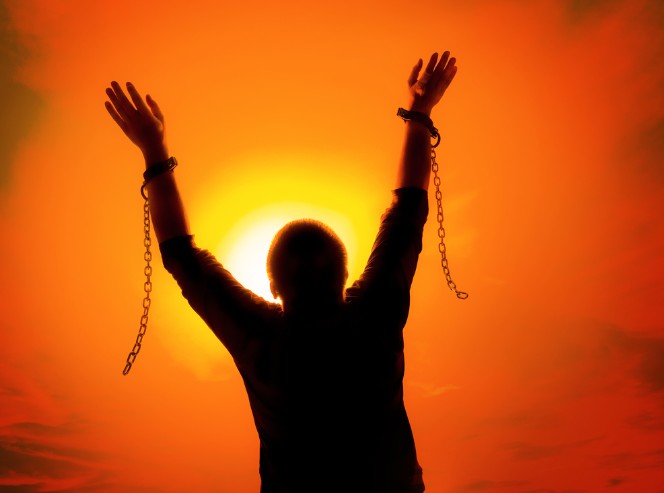Faith
What Is True Freedom? Judaism’s Timeless Answer to the Illusion of Liberty
Exploring why “freedom from” often leads to new forms of slavery and how inner freedom of the soul endures

Sigal, my secular colleague from a few years ago, was the last person I expected to hand me a set of Jewish books. And yet, with her streaks of blue in her hair and her non-Jewish partner, offered me a copy of Tanya and another of Orot HaTeshuva. “We’re moving apartments, and I have no use for these anymore,” she explained. “I used to read them, but I stopped.”
When I tried to understand why her interest in Judaism had faded, she shrugged. “There was a time I was curious. I read, I went to lectures… but it’s not for me. I liked a lot of what I heard, but Judaism just ties you down too much. Everything has rules: this is forbidden, that has to wait until later. And my boyfriend? Forget it. Just because he’s Dutch, it’s automatically not acceptable. That’s not for me. I’m a freedom-loving type, you know.”
The books are still with me. I haven’t seen Sigal in years, but from what I hear, she still loves “freedom”, and therefore keeps her distance from anything resembling Jewish tradition.
“Free” to Find New Forms of Slavery
In the early years of the State of Israel, the common Hebrew term for secular Jews was chofshi — “free”. The pioneers who built the country took pride in that label: they had left behind the “chains of religion” in the Diaspora and walked into the sunlight of freedom.
Even though the word has mostly disappeared from everyday language, its meaning still shapes how many secular Jews think. Almost every description of ultra-Orthodox society still uses the word “ghetto” (or “escape from the ghetto”). Almost every secular Jew who befriends a religious Jew eventually asks if a particular mitzvah isn’t just too restrictive. And almost every religious Jew who wants to prove how “enlightened” or “modern” he is makes sure to clarify that yes, he’s observant, but not a “stifling fanatic.”
This obsession with freedom is, of course, very modern. Three hundred years ago, a Jew who kept Torah and mitzvot might have been criticized for many reasons — but no one accused him of lacking “freedom.” The idea that every human being is born free is relatively young, appearing only around the time of the American Revolution, and even there, applied inconsistently for many decades.
The famous psychoanalyst Erich Fromm, in his book Escape from Freedom, described humanity’s struggle for liberty: from the feudal bonds of the Middle Ages to the breakdown of rigid class structures, the modern West gradually tore down barriers and declared itself “free”. However by the 20th century, Fromm noted, people were overwhelmed by this very freedom.
“For modern man,” he wrote, “freedom has a double meaning. He has been freed from traditional authority and become an ‘individual’. At the same time, he has become isolated, powerless, an instrument of external forces, alienated from himself and from others. This situation undermines his sense of identity, weakens and frightens him, and makes him ready to submit to new kinds of bondage.”
 (Photo: shutterstock)
(Photo: shutterstock)What Does It Mean to Be Truly Free?
Fromm argued that modern society defined liberty as negative freedom — “freedom from…”: freedom from religious authority, from rulers, from social conventions, from coercion. Freedom was understood only in terms of rejection.
When people finally gained this “freedom from,” they found themselves lost, and in some cases, open to terrible new forms of enslavement. Fromm pointed to Nazism as the most extreme example, but noted that anyone who defines liberty as only “freedom from” is actually primed to fall into new chains.
Human nature itself seems to lean toward dependence. Children quickly learn to mimic others, to protest being dressed in something “nobody else wears,” or to demand what “everyone else has.” Teenagers claim to be discovering individuality, but mostly within the boundaries of what their peers approve of.
Adulthood doesn’t magically cure this. If we escape the need to conform, we often fall into other forms of slavery such as to parents’ expectations, to financial ambition, to career pressure, or to social approval. The modern Western promise of unlimited “freedom from” leaves us vulnerable to subtler prisons of competing with neighbors, idolizing celebrities, and chasing trends.
 (Photo: shutterstock)
(Photo: shutterstock)Judaism’s Radical Definition of Freedom
Against this background, Judaism offers a very different definition of liberty. The Sages taught: “‘And the tablets were the work of God, and the writing was the writing of God, engraved (charut) upon the tablets’ (Exodus 32:16). Do not read charut (engraved), but cherut (freedom). The only truly free person is one who engages in Torah.” (Avot 6:2)
At first glance, this sounds upside down. Isn’t Torah all about restrictions? Secular critics — and even many religious Jews — view mitzvot as limiting. Passover illustrates this vividly when many complain about being deprived of bread for just a week. Shabbat is dismissed as stifling: no travel, no beach, no technology — “just suffocation”.
The freedom the Sages describe is inner freedom which is not just “freedom from,” but “freedom to”: the ability to rise above material cravings, peer pressure, and the tyranny of public opinion. True freedom is listening to the voice of the soul, to the spark of spirituality inside every human being.
Rabbi Abraham Isaac Kook once wrote: “Ordinary ‘freedom of thought’ is often nothing more than enslavement of thought disguised as liberty. For in the frenzy to chase conventional ‘freedom,’ a person distances himself from the great treasures of higher freedom — the eternal truths inherited by the human soul.”
 (Photo: shutterstock)
(Photo: shutterstock)Jewish History as the Story of Inner Freedom
This higher freedom has been Judaism’s hallmark throughout history. Despite centuries of exile, persecution, and poverty, the Jewish people produced vast spiritual treasures: the Talmud, medieval commentary, philosophy, poetry, and mysticism.
The Tosafists of 12th–13th century France and Germany wrote their monumental works while enduring Crusades, expulsions, and pogroms. Rabbeinu Tam narrowly survived a Crusader mob. Rabbi Meir of Rothenburg (the Maharam) died in prison rather than allow his community to pay an exorbitant ransom. And yet their teachings endured, and still shape Jewish learning today.
By any worldly measure, they were not “free”, but in the deepest sense, they were freer than their captors, because their minds and souls lived beyond physical chains.
As the Baal Shem Tov taught: “A person is where his thoughts are.”
One whose thoughts dwell in Torah and in connection with God, remains forever beyond the reach of earthly prisons.
It is this very freedom — freedom of the soul — that Rabbi Yehuda HaLevi captured in his famous poem:
“Slaves of time are slaves of slaves;
Only the servant of God is truly free.
Therefore, when every man seeks his portion,
My soul says: My portion is God.”

